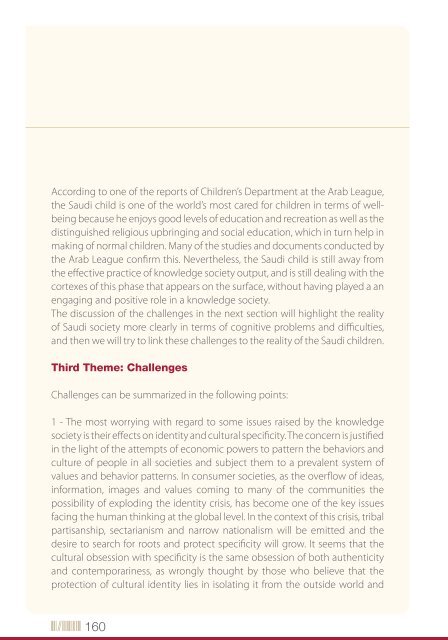General Supervisor
General Supervisor
General Supervisor
Create successful ePaper yourself
Turn your PDF publications into a flip-book with our unique Google optimized e-Paper software.
According to one of the reports of Children’s Department at the Arab League,<br />
the Saudi child is one of the world’s most cared for children in terms of wellbeing<br />
because he enjoys good levels of education and recreation as well as the<br />
distinguished religious upbringing and social education, which in turn help in<br />
making of normal children. Many of the studies and documents conducted by<br />
the Arab League confirm this. Nevertheless, the Saudi child is still away from<br />
the effective practice of knowledge society output, and is still dealing with the<br />
cortexes of this phase that appears on the surface, without having played a an<br />
engaging and positive role in a knowledge society.<br />
The discussion of the challenges in the next section will highlight the reality<br />
of Saudi society more clearly in terms of cognitive problems and difficulties,<br />
and then we will try to link these challenges to the reality of the Saudi children.<br />
Third Theme: Challenges<br />
Challenges can be summarized in the following points:<br />
1 - The most worrying with regard to some issues raised by the knowledge<br />
society is their effects on identity and cultural specificity. The concern is justified<br />
in the light of the attempts of economic powers to pattern the behaviors and<br />
culture of people in all societies and subject them to a prevalent system of<br />
values and behavior patterns. In consumer societies, as the overflow of ideas,<br />
information, images and values coming to many of the communities the<br />
possibility of exploding the identity crisis, has become one of the key issues<br />
facing the human thinking at the global level. In the context of this crisis, tribal<br />
partisanship, sectarianism and narrow nationalism will be emitted and the<br />
desire to search for roots and protect specificity will grow. It seems that the<br />
cultural obsession with specificity is the same obsession of both authenticity<br />
and contemporariness, as wrongly thought by those who believe that the<br />
protection of cultural identity lies in isolating it from the outside world and<br />
160<br />
protecting it from the effects of universal culture. It is needless to emphasize<br />
that the cultural identity which needs to be protected from alienation is the<br />
culture of creativity, and not the consumption culture, the culture of change<br />
and not the overall culture of inertia, the culture of national unity with its<br />
human civilization prospect, and not the culture of the disintegrated parts,<br />
each of which is considered an alternative to the nation. So, some segments<br />
of the Saudi society fear from becoming a knowledge society because of their<br />
fear for their identity and originality. For that reason we see them resisting<br />
transformation and insist on adhering to the old ways, which over the years,<br />
have become part of the identity and cultural characteristics of the nation.<br />
2 - One of the most important challenges of the knowledge society is the<br />
problem of separation of activities and their disintegration. For example,<br />
we find the mismatch between the topics of education and its curriculum,<br />
and the topics of scientific research and its output on one hand, and the<br />
requirements of institutions of knowledge employment and the needs of<br />
work and development on the other hand. It is very necessary to acknowledge<br />
interaction of activities within the framework of an integrated cycle to which<br />
education is linked with scientific research, and also linked the two with<br />
employment of knowledge in order to achieve development. For this reason,<br />
knowledge activities should be activated within what is known as the cycle<br />
of knowledge or the framework of knowledge, based on five axes rotating<br />
in the orbit of the transformation processes towards the knowledge society.<br />
The first of these axes requires the setting of a common strategy for all<br />
knowledge activities, while the second axis focuses on the production and<br />
delivery of technology, and the optimal and wider use of it. The third axis is<br />
concerned with institutions and bodies within the system of society, whether<br />
governmental or private, and their role in activating knowledge. The fourth<br />
axis deals with human knowledge, whether adult or child their capacity as the<br />
mainstay of knowledge society besides the development and growth of such<br />
161


